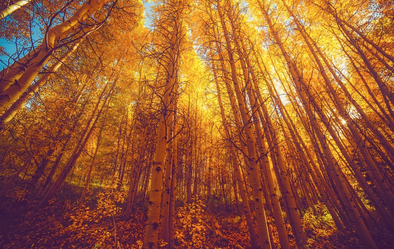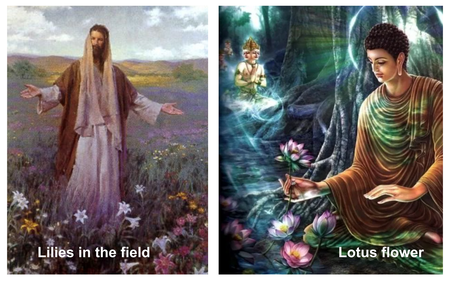 After 28 years of living in the northern hemisphere, my tropical genes still do not welcome the arrival of cold air of fall. However, my eyes welcome the vibrancy of the colors that come with the change: the bright yellows, reds, and oranges on the trees. My neighbors and my family put pumkins on our porches. I dug a hole and buried my tulip bulbs for the spring. The beautiful zinnias in my front yard finally succumbed to the cold, lost their colors, and readied themselves to return back to the earth. I am thankful for the fall season's reminder that nothing is permanent. Impermanence in Sports  I learned the spiritual practice of impermanence through athletics, specifically, Brazilian Jiu Jitsu. In martial arts, rigidity of form will get in the way of your performance. When I roll with my training partners on the mat, my coaches encourage me to move fluidly with impermanence as best I can by adapting my movement to my training partner's movement. I often hear them invite me not to let my fight-flight brain to take over, which slows the practitioner's progress. In a fear-based fight-flight approach, my muscles are stiff, my heart is racing fast, my breathing shallow, certain muscles that do not need to be activated are in full tension. My physical actions are not well thought out. I get tired fast, more prone to injury, and I'm not having fun. Instead, I hear my coaches telling me to relax, to slow and deepen my breathing, and pay full attention to what my body is doing in relationship to my training partner's movements. They invite me to not focus on the end result (winning or losing), but pay attention to the present and have a good sense of fun and play. (For a more comprehensive discussion on this topic, read Matt Thornton's blog "Mindfulness & Martial Arts.") As the late martial arts philosopher Bruce Lee puts it: Empty your mind. Be formless, shapeless, like water. If you put water into a cup, it becomes the cup. You put it in a teapot, it becomes a teapot. Now water can flow, or it can crash. Be water my friend." On Life & Music by Alan Watts Eastern philosopher Alan Watts also makes the value of non-attachment clear when he reflected on "Life and Music":  "In music, one doesn’t make the end of the composition the point of the composition. If that were so, the best conductors would be those who played fastest, and there would be composers who wrote only finales. People would go to concerts just to hear one crashing chord — because that’s the end! But we don’t see that as something brought by our education into our everyday conduct. We’ve got a system of schooling that gives a completely different impression. It’s all graded and what we do is we put the child into the corridor of this grade system, with a kind of, “Come on kitty kitty kitty!” and now you go to kindergarten, you know, and that’s a great thing because when you finish that you’ll get into first grade. And then — Come on! — first grade leads to second grade, and so on, and then you get out of grade school. You go to high school and it’s revving up — The thing is coming! — then you’re gonna go to college, and by jove, then you get into graduate school, and when you’re through with graduate school you go out and join the world. Then you get into some racket where you’re selling insurance, and they’ve got that quota to make and you’re gonna make that, and all the time “the thing” is coming — It’s coming, it’s coming! — that great thing: the success you’re working for. Then when you wake up one day, about 40 years old, you say, “My God, I’ve arrived! I’m there!” And you don’t feel very different from what you always felt. And there’s a slight let down because you feel there was a hoax. And there was a hoax. A dreadful hoax. They made you miss everything. We thought of life by analogy with a journey, with a pilgrimage, which had a serious purpose at the end, and the thing was to get to that end: success, or whatever it is, or maybe heaven after you’re dead. But we missed the point the whole way along. It was a musical thing — and you were supposed to sing, or dance, while the music was being played." Empire Affective Disorder In this reflection, Alan Watts critiques western society's obsession with the trophy of success. But mystics like Watts know too well that such things are illusions, much like a person dying of thirst walking desperately towards mirages in a dessert. Hence, the early Christians were wary of religion when it mixed with the values of the state. Soon after Emperor Constantine declared Christianity as the religion of the Roman empire, the desert monastic movement grew as they moved from urban areas to the wilderness of the desert. In her book, The Forgotten Desert Mothers, Laura Swan discusses how Christians felt a "conflict between the growing power associated with the institutionalization of the church and the pursuit of holiness," and that Christianity was compromised (for example, many conversions to Christianity was for political expediency to access power). A central reason for this conflict, I believe, is that the Christian mystics understood that the values of the empire and the values of the Spirit are antithetical to each other. Grounded on fear and anxiety of fight-flight model of living, the empire is hooked on power, control, permanence. These are the values that Jesus rejected when the demon visited him in the desert to tempt him, namely, the power to transform anything for one's self-centered needs, political control through ownership of kingdoms, and immortality. Theologian, Lynice Pinkard, states that this particular spiritual illness may be called empire affective disorder and its symptoms are fear and anxiety. To self-medicate, those with empire affective disorder use a powerful drug - a mix of a toxic brew of lust for material things (consumerism), superficial blind nationalism, and violence. I believe that this toxic brew can result in two self-destructive ways of being in the human spirit: 1. Nihilism - aka meaninglessness, which is inward driven (implosion of self-destruction). 2. Narcissism - self-centeredness on steroids - which is outward driven (explosion of violence towards others). Spiritual Practice of Apatheia To rebel against the values of the empire, the Desert Mothers took Jesus' invitation seriously through their monastic spiritual practice of apatheia: an antidote to spiritual illness caused by empire affective disorder. In Laura Swan's book, The Forgotten Desert Mothers, apatheia is the: “interior spiritual journey (mature mindfulness) in which the inner struggle against inordinate attachments has ceased, and one is free of pulls from worldly desires, attachments to ego, self-imposed perfectionism.” The desert monastics used the wilderness of the desert to achieve this goal. To mystics nature is a stepping stone to disentangle oneself from the shackles of the ego.  Flowers & Nature One reason for this is that in the vastness of nature, the human self is insignificant and ceases to be the center. Nature's transitoriness and ever-changing quality make the illusion of permanence more clear. We experience "oneness" with the beauty of nature in the present. To Jesus, this is where God's kingdom resides - not in the faraway future, but in the eternal now. Jesus says: "“Consider the ravens: They do not sow or reap, they have no storeroom or barn; yet God feeds them.” And “Consider the lilies of the field, how they grow; they neither toil nor spin, yet I tell you, even Solomon in all his glory was not clothed like one of these.” The Buddha shared a similar insight using a flower. As the disciples of the Buddha sat around him in a small circle by a quiet pond to wait for his teaching, the Buddha simply pulled out a lotus flower and silently held it before them. These two mystics, Jesus and the Buddha, invite us to observe the ways of creation. In nature, nothing is permanent, but beauty, abundance, and grace overflows. As we move together with impermanence in the fall season, let us take a deep breath, be present in our bodies, and sing and dance while the music is played.
Charlesly
11/9/2019 06:53:00 am
This American culture breeds craving of permanence. Thank you for the reminder that flowers, nature constantly show us impermance. I also note that my spell checker does not even recognize the word impermance. Comments are closed.
|
Donnel Miller-MutiaJoin me in chewing the cud on mindful communication and relationships, self-awareness, spirituality and mythology. Archives
May 2024
Categories |
Proudly powered by Weebly
 RSS Feed
RSS Feed
